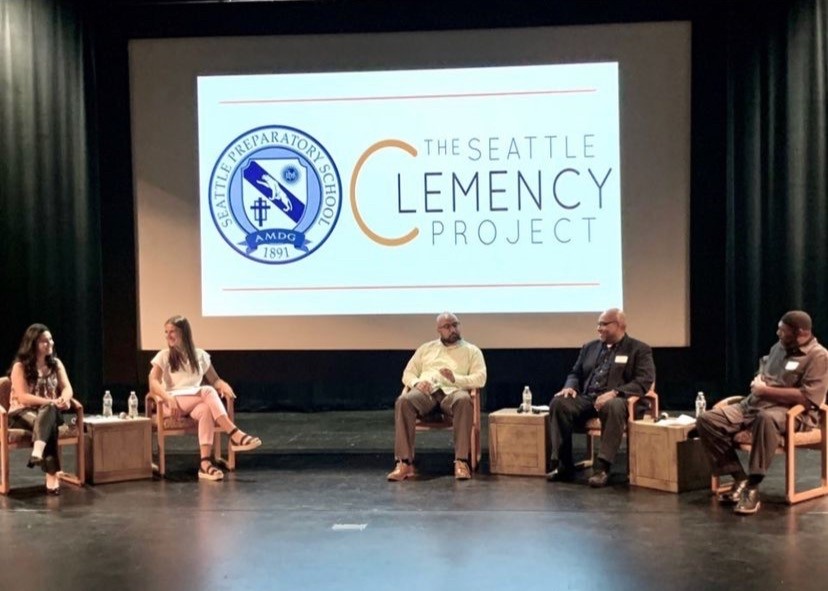Students Seeking Justice Bring Panel to Prep
October 11, 2021
On August 17th, a panel sponsored by the Seattle Clemency Project (SCP) and led by Daniella Castillo-Cayon ’22 and Maia Miller ‘22 gathered in Seattle Prep’s Healy theater to discuss Criminal Justice in Washington State.
Castillo-Cayon described, “The primary goal of bringing the panel to Prep was to educate the Prep community on the injustice of the criminal justice system in Washington. The Prep community has always been passionate about social justice, and we thought the panel at Prep would be a great chance to educate the community about criminal justice and promote the work of the Seattle Clemency Project.”
Mr. Deino Scott, Director of Adversity, Equity, and Inclusion at Seattle Prep explained, “The main function of the presentation was a culminating project by Prep students who were interns with Seattle Clemency Project.”
Prep parent and Seattle Clemency Project co-founder, Jennifer Smith, helped students become involved through internships with the SCP.
Panel members included Freddie Hampton, Anthony Powers, and Karlton Daniel. All three panelists experienced consequences of the sometimes unfair system of criminal justice in Washington, ranging from the controversial “three strikes” law, to an unconstitutional sentence, to the incarceration of an innocent man. Still, each of these men persevered, even when it seemed the world was against them.
Hampton was a victim of Washington State’s three strikes law. Hampton was never made aware of the fact that he had committed “strikeable” offenses until it was too late and he was sentenced to mandatory life without parole for committing non-violent robbery. While in prison, Hampton took classes and worked on bettering himself. Both the Muslim community and his “trust in God” helped him persevere through his time in prison.
SCP assists incarcerated people in seeking early release when convicted through the “three strikes” law. This law states “that any individual charged with three ‘strike-able’ felonies be sentenced to life in prison without the possibility of parole.”
Scott gave his take, “It’s kind of a mentality. Just lock them up, put them away, and we don’t need to worry about them.”
Anthony Powers was sentenced to 77 years in prison without parole at the age of 16. Later, the state ruled that it was unconstitutional to send a juvenile to prison for life. Powers was granted early release in 2019, after spending 26 years in prison. He is a founder of the Redemption Project, served as a facilitator for Roots Success, and was a leader in the Department of Corrections.
Karlton Daniel served 22½ years in prison for a crime he did not commit. He was released 8 years ago. Daniel serves as a mentor to men in prison, encouraging them to change for the better and see new possibilities for their lives. He is also a co-founder of The Redemption Project with Anthony Powers.
Panel host Castillo-Cayon shared, “The three panelists proved to everyone in the audience that incarcerated individuals are capable of bettering themselves and are more than deserving of clemency.”
In response to the panel, Castillo-Cayon commented, “From the feedback we received, it became obvious that the audience was truly inspired after the panel. We had a question and answers section after the interview section of the panel, and every person who asked a question began by thanking the three panelists for their courage, perseverance, and sharing their story. The audience went away from the panel both disappointed by the injustice of the criminal justice system but inspired by the three incarcerated individuals and what they had to go through.”
There are countless examples of unfairness in the Criminal Justice system and as Scott put it, “The idea that some people do get unjustifiably long sentences for things, minor things. Some people do get thrown in jail even though they are innocent, and it’s unfortunate that we have to do something, we have to have groups like this to help figure it out for people.”
Scott said, “Justice isn’t always justice it isn’t always fair, our concept isn’t always fair, but it’s good and it’s wonderful to have organizations like Seattle Clemency to dig in to make it fair and to see if it was fair. As a society, gives us checks and balances.”
It can be sad, disturbing, and angering to hear these stories of injustice, but there is hope for change. Scott shared, “I think it’s important that kids in our community know that these injustices take place, but it’s also important to know that there are organizations that try to make it right, and they can get involved with those organizations.”
Whether it is reading more about the how the criminal justice system needs reform, listening to panel discussions such as the one at Prep, or even taking on an internship with SCP, advocating for justice is a part of the Seattle Prep mission, and as Scott stated, “Social justice runs in our Jesuit veins.”



